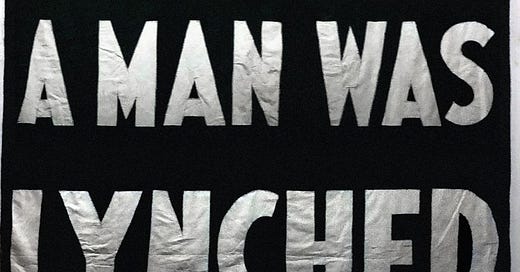For white people drafting and redrafting the perfect post in the wake of another viral Black tragedy
These moments matter. But not in the way we pretend they do.
Notes: This week’s issue is dedicated to George Floyd. It is also dedicated to racial justice activists in the Twin Cities who’ve been fighting an uphill fight for a long while now. I tossed a few bucks to Voices For Racial Justice and will be following their work and action suggestions. The dedication is a new feature around these parts, inspired by the current series Dr. Adrienne Keene is doing at her always stellar Native Appropriations blog.
Also, regular readers will recognize that this is shorter and more straightforward than usual. I’m sure we’ll be back to unnecessary hyphenations and tangential asides soon enough.

We have been here before, haven’t we? Black death and/or despair on display. A video, too horrific to watch but nearly impossible to ignore. A news cycle or two of pure, undivided attention. Hashtags and Instagram art. Points and counter-points.
And through it all, there we are. White people. Nice white people trying to do the right thing. Sometimes we stay silent. Sometimes we post and retweet with fury and abandon. We draft and re-draft posts, wanting neither our silence nor our rhetorical clumsiness to attract notice. We try to pick the perfect Black voice on which to hitch our wagon. We’re not trying to make this about us again, no really. Trust us. We’re trying to focus on the intense tragedy of the moment, the rage and sadness Black people are feeling, the broader fight for justice. But still, we keep looking over our shoulder, waiting for the thumbs up or thumbs down.
For many of us, these moments are the thin funnel into which we direct all of our racial justice energy. I know because I’ve done it myself. I remember times like this where I’ve gone to a protest a day for a week before returning back to my life, struggling to remember the names of the young men for whom I purportedly marched a few months later. I know because I’ve given counsel to white people who run large organizations who’ve wondered “how do I respond in this moment?” but who a few weeks later won’t return the calls of the Black organizers to whom they were introduced. I know because, again, we’ve been here before.
What if instead, we approached these flash point moments simultaneously as if they matter quite a bit and as if they aren’t what really matters at all?
These moments matter not because they are where racial justice is won or lost. Let’s be very clear— if a Black body is dead on the ground or being threatened with the possibility- justice has already lost. Whether the villain in the story loses their job or is charged in criminal court, the loss will remain. The moment matters though, because of its insidious ability to dredge up fear and rage and sadness and intense feelings of alienation for many Black people who are still living. Black people with whom you work. Black people in your family. Black people whom you’re lucky enough to consider friends. Black people you’ve never met. Some moments are for organizing and some are for grandstanding and some are for providing emotional comfort and support. It is in our inability to identify which is which that we make all this about us.
When we focus on grand gestures and our own obsession with whether we’re appearing sufficiently anti-racist, what we’re not doing is noticing (and respectfully asking, if the relationship is truly there) what Black people in our lives need in this immediate emotional moment. Some people whom you know and love may want you to post. Some may want you to listen to them and stay silent. Some may want you to leave them alone. Some may not care one bit what you’re doing now but will feel supported or let down depending on what you are or aren’t doing a month from now. Some may not be impacted by this most recent viral moment but may have other sources of anger and sadness in their heart. Some may be really pissed at you for a whole other set of reasons. The point is, in these moments, that’s the work. People whom you purport to care about are hurting, in ways that are both universal and personal, shared and unique.
This leaves the glaring question, though: If these reactionary flashpoint moments aren’t where the long term work of building just systems lives, what does that work look like? And sure, there are no shortage of lists and resources to gain technical answers to that question. Those lists, they’re good! But here’s the thing: That muscle we could be building right now— listening to those who are hurt the most, aligning our response to what we’re hearing and being more conscious and critical about the part of our reaction that is more about building our own reputation— well, that’s always where the work can be found. Whether the voices are Indigenous or Latinx or Asian or Black. Whether they’re distant activists in other towns you’ll never meet or the co-worker down the hall or the parent with the family conference slot directly before yours. The muscle is always the same. Listen. Not for evidence of how to avoid messing up but for a deeper understanding of how somebody else has to walk in this world. Offer the support that’s been asked. Listen again if you learn that your first response didn’t help. Try again. Repeat.
These moments do matter, but so too do a million other moments.





